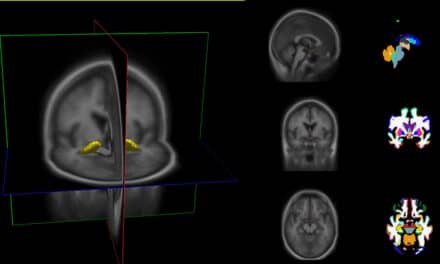Turing Medical Technologies Inc. (formerly NOUS Imaging Inc.), a neuroimaging software company, announced the launch of FIRMM-pix: a novel in-bore visual biofeedback module to actively reduce head motion during brain MRI. A complement to Turing’s existing FIRMM software, FIRMM-pix may further improve image acquisition efficiency and data quality.
MRI scans have long been plagued by motion distortions, often leading to compromised image quality. However, Turing’s FIRMM software revolutionizes the field by monitoring head motion during MRI providing continuous actionable feedback to technologists. This invaluable information enables technologists to determine the optimal point at which sufficient usable data has been collected, ensuring that only high-quality images are obtained. FIRMM empowers technologists to make informed decisions in real-time, saving time and resources.
Turing’s latest innovation, FIRMM-pix, integrates seamlessly with FIRMM and takes the solution a step further by providing visual biofeedback to the patient about their head motion. FIRMM-pix combines biofeedback and gamification to create an immersive in-bore experience that coaches patients to stay still, addressing motion at its source. The premier game, Puppy Dreams, features licensed movie content and a comforting dog as the patient’s reliable guide, keeping them informed about any movements during the scan. To combat anxiety, this game’s content and biofeedback work harmoniously to help patients successfully complete the scan while staying calm and still. FIRMM-pix is reportedly the only visual biofeedback game solution for reducing head motion.
Radnet CTO, Dr Lawrence Tanenbaum, emphasizes the importance of this innovation: “Motion-induced induced image degradation remains a significant weakness of brain MRI, making it difficult to acquire a scan quickly. With a solution like FIRMM-pix, we have the potential to conduct high-fidelity scans without compromising important data and without the need for anesthesia. Moreover, its patient-centric design fosters active participation, making the scanning process more comfortable and inclusive for patients.”
“This platform expansion further propels Turing in the direction of synthesizing the next generation of MRI related data analytics and processing through safe, patient-centric software innovation,” says Turing President and CEO, Ken Bruener. “By offering the FIRMM-pix solution, we believe we can not only address challenges with image quality, but we can expand the utility of MR in the advanced neuroimaging field.”
Featured image: Programmed with absorbing content, FIRMM-pix allows patients to select a movie or short film to watch during their brain scan. Cues and prompts appear as video content streams providing visual feedback to patients about their motion. Movie watching coupled with visual feedback reduces movement, improving overall data quality. Image: Turing Medical Technologies






